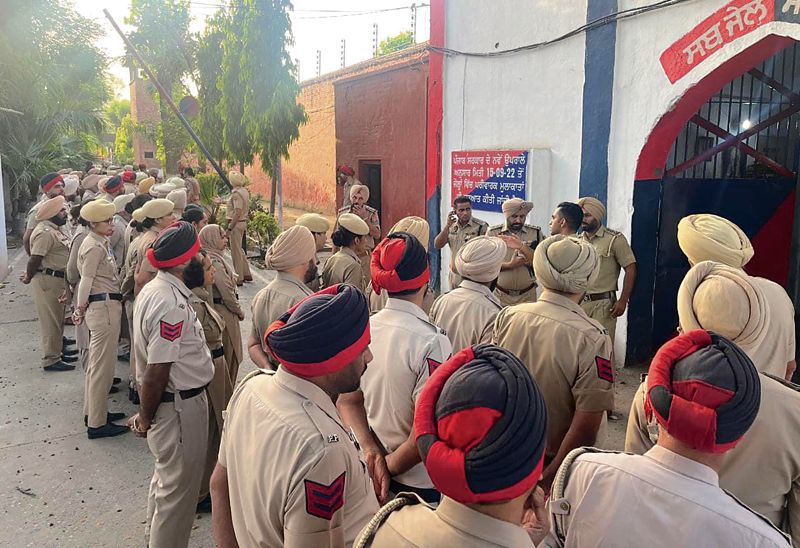
way forward: A robust grievance redressal mechanism can help in defusing tensions among prisoners. Ideally, jails should be open to scrutiny by independent observers. Tribune photo
KP Singh
Former DGP, Haryana
A clash between two groups in the Sangrur jail on April 19 resulted in the death of two prisoners and serious injuries to two others. Last month, at least four police personnel, including the area SHO, were hurt when they tried to stop a clash at the central jail in Gurdaspur. Punjab’s prisons have witnessed several incidents of violence and rioting in the past decade. In February 2023, two gangsters were killed in a fight inside the Goindwal Sahib central jail in Tarn Taran district. In June 2019, rioting prisoners had confronted the police in the Ludhiana jail, leaving one inmate dead and five officials injured. Three jail staffers were injured after prisoners ran riot in the Gurdaspur prison in March 2017.
The criminology of violence in prisons may be deconstructed by understanding the prison social structure and regimes which often generate competition due to scarce resources. Moreover, the prison environment is exploitative and the expected response of inmates to being wronged is to resort to violence. Mental illness, caste and religious equations, the nexus between inmates and prison staff, cultural differences, living conditions and gang affiliations are other crucial factors that are the root causes of fights in jails.
In the case of Punjab’s prisons, the majority of the fights are not over material goods but about non-material interests such as dominance, respect, fairness, loyalty, gang rivalry and supremacy. This is the reason why they are premeditated and broad-based, calling for police intervention most of the time.
A joint study conducted a couple of years ago by the Commonwealth Human Rights Initiative and the Punjab State Legal Services Authority revealed that 18 out of 24 Punjab jails were overcrowded; 25 per cent of the staff posts were vacant; 17 jails were working without welfare officers; external oversight mechanism was generally non-functional as only one prison had a ‘Board of Visitors’, a statutory body for monitoring jails; 12 per cent of the 660 inmates interviewed alleged custodial violence; prisoners in 15 correctional facilities alleged smuggling and supply of contraband inside jails.
All these facts together stand testimony to the lack of resources, transparency and fairness in jails in Punjab, which has a definite bearing on life and security inside prisons. In the face of such ground realities, prisons are dangerous, dehumanising and traumatising places where violence is unavoidable.
In July 2022, the state government launched a drug screening survey, involving 30,000 prisoners. It came to light that over 47 per cent of the inmates surveyed were addicted to drugs. The presence of such a large number of substance abusers within a small place is in itself a ticking bomb waiting to go off.
The addicts cannot survive without drugs, and they arrange it through gangs that have sprung up inside prisons, inevitably in connivance with prison officials. These gangs indulge in violence when their interests clash. Multi-pronged drug de-addiction programmes are needed to rescue substance abusers; the current interventions are proving insufficient and ineffective.
Over the years, prisons in Punjab have emerged as much-favoured destinations for gangsters in North India. The late Mukhtar Ansari, a gangster-politician from Uttar Pradesh, managed a ‘safe and comfortable’ stay in the Rupnagar jail. Last year, gangster Lawrence Bishnoi gave an interview to a news channel from a jail in Punjab and threatened actor Salman Khan. Threatening messages and ransom calls by gangsters from behind bars indicate a compromised prison administrative machinery.
Prisons are colonies of highly volatile people who are not sufficiently engaged in gainful activities as only 20 per cent of the convicts sentenced to undergo rigorous imprisonment can be given work in jail factories. More than 75 per cent of the inmates are undertrials who cannot be forced to work as a matter of policy. Such an idle workforce in a small area is a threat to peace. It calls for tweaking the laws and creating enough work opportunities for prisoners.
In the absence of a rational transfer policy, tainted jail officials manage their postings at places of their choice. This factor alone helps them develop a nexus with gangsters in a quid pro quo, resulting in discriminatory, illegal and corrupt practices which increase unresolvable ‘friction points’.
With Punjab being a relatively small state, no prison official should be allowed to work at a place for more than two years. Similarly, duties inside a prison should be rotated after a reasonable period, in addition to weeding out undesirable elements from service in periodic reviews.
Secrecy is inbuilt in prison systems. The jail administration functions in a closed environment by raising the bogey of security of prisoners. They do not like any external oversight mechanism to oversee their working, despite the fact that there are statutory provisions mandating the same. Ideally, jails should be open to scrutiny by independent observers. A robust grievance redressal mechanism for prisoners can help in defusing inter-group tensions before they spin out of control.
The advisories issued by the Central Government in 1998, 2006 and 2015 for curbing violence in prisons have recommended tightening of security arrangements, following the narrative of ‘laxity of security’ rather than promoting transparency and participative prison management. A paradigm shift is required to provide solutions to prison violence.
The existing prison laws are strict enough to meet the requirements of jail discipline if the prison managers are serious about their responsibilities. The accountability of senior officers after every incident of violence in prisons needs to be fixed and the guilty punished after a thorough inquiry. A border state like Punjab cannot afford riots in its prisons.
Join Whatsapp Channel of The Tribune for latest updates.





















